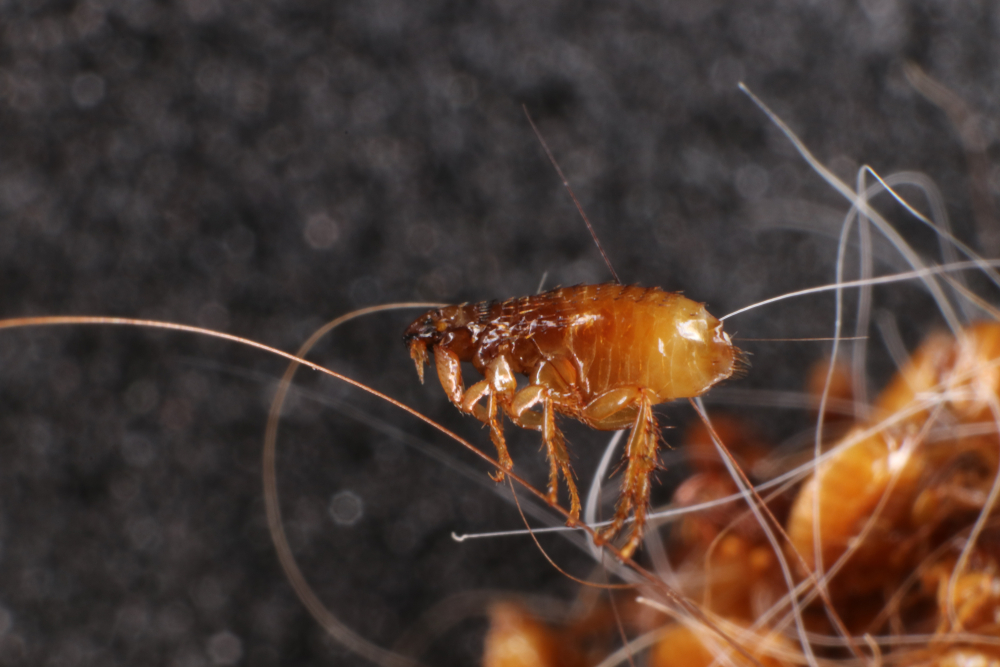Summertime is the perfect time to explore the outdoors with your pet. With abundant sunshine and fresh air, this is the season to camp, hike, hang out by the water, and enjoy other activities. Unfortunately, as the weather warms up, fleas and ticks become more active, posing a significant threat to pets. Effective flea and tick prevention is crucial to maintaining your furry friend’s health and safety. Our Neighborhood Veterinary Centers team provides effective tips for protecting your pet from these pesky invaders.
Flea- and tick-borne threats to pets
Fleas are small, wingless insects that feed on mammals’ and birds’ blood. They can cause itching and allergic reactions, and transmit tapeworms and other virulent diseases, including plague and murine typhus. Ticks are arachnids that also feed on blood and can transmit serious illnesses such as Lyme disease, Rocky Mountain spotted fever, and anaplasmosis. Many parasitic diseases are zoonotic, which means they can be transmitted between humans and animals. Because of the extensive health issues these pests can cause, keeping your pet on parasite prevention is paramount to your entire family’s health.
Flea and tick prevention for pets
Fleas and ticks are not only nuisances; they transmit diseases and infest your home and yard. Keeping these pesky pests at bay requires maintaining your pet’s parasite prevention. Preventive medications are available in the following forms:
- Topical treatments — Spot-on treatments are applied directly to your pet’s skin, usually between the shoulder blades. These treatments spread across the skin’s surface, killing fleas and ticks on contact and preventing infestations. Shampoo is another topical treatment, killing fleas and ticks on contact, providing your pet with immediate, soothing relief. However, topicals do not always provide long-term protection and should be used in conjunction with other preventives as recommended by our Neighborhood Veterinary Centers team.
- Oral medications — Our team recommends oral medications because they are safe and reliable, and most pets ingest them as they would treats. Oral flea and tick preventive medications are administered as chewables or tablets. They work systemically, killing parasites when they bite your pet. Oral preventives are convenient and effective, providing protection for up to 30 days before you administer your pet’s next dose.
- Collars — Flea and tick collars, while less expensive than other preventive forms, are less effective and pose health risks to pets and people. Many dogs are allergic to these collars, resulting in rashes, vomiting, and diarrhea. The chemicals in flea and tick collars might pose health risks to household pets, children, and pregnant women. While these products remain Food and Drug Administration (FDA)-approved, discuss flea and tick collar safety and efficacy with our veterinary team before use.
At-home flea and tick control for your pet

Once your pet is on a parasite preventive, ensure your environment stays flea- and tick-free. Implement the following strategies:
- Maintain a tidy home — Regularly vacuum carpets, rugs, and furniture, and frequently wash your pet’s bedding and bed to rid them of fleas, flea eggs, and ticks.
- Maintain a tidy yard — Keep your yard tidy by mowing the lawn regularly and removing weeds and debris from areas in which fleas and ticks can thrive. Additionally, consider trimming overgrown shrubs or removing them altogether.
- Regularly check your pet — Check your pet’s skin and coat regularly for fleas and ticks, especially after spending time outdoors. Pay close attention to body areas where ticks like to hide on pets such as around the ears, neck, and under the legs. Fleas can often be detected in the fur around the tail base. Promptly remove ticks from your pet’s skin and coat to prevent disease transmission.
Flea and tick prevention is crucial. You can protect your furry pal from these harmful parasites by regularly administering parasite preventives and maintaining your indoor and outdoor environment. Before starting your four-legged friend’s flea and tick prevention regimen, contact our Neighborhood Veterinary Centers team, so we can recommend the most effective products for your pet’s specific needs, ensuring that the method is safe and effective.






Leave A Comment